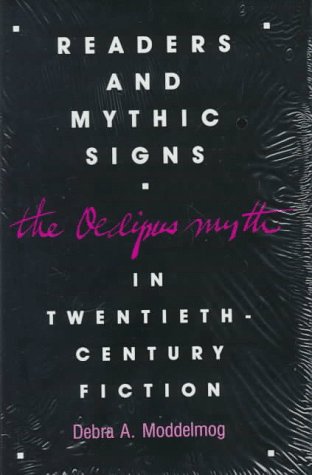Books by Debra Moddelmog
Ernest Hemingway in Context
Author(s): Professor Debra A. Moddelmog, Professor Suzanne del Gizzo
Publication date: 2015-12-03
ISBN: 1107429315, ISBN-13: 9781107429314
Reading Desire: In Pursuit of Ernest Hemingway
Author(s): Debra A. Moddelmog
Publication date: 1999-09-16
ISBN: 0801486351, ISBN-13: 9780801486357
Readers and Mythic Signs: The Oedipus Myth in Twentieth-Century Fiction
Author(s): Associate Professor Debra A Moddelmog PhD
Publication date: 1993-07-28
ISBN: 0809318466, ISBN-13: 9780809318469
Debra A. Moddelmog offers the first book to explore fully the process of reading and interpreting myth in fiction.
Some literary scholars view myth criticism as passé, an approach to literature that enjoyed a heyday in the l950s and 1960s before being replaced by approaches that are considered to be more theoretically sophisticated and satisfying, such as feminism, new historicism, and deconstruction. Moddelmog argues that there are many good reasons not to cast out myth criticism from the community of critical approaches. Most obvious among them is that myth has attracted many writers of this centuryfrom James Joyce to Thomas Pynchon, Virginia Woolf to Flannery O’Connor, Thomas Mann to Alain Robbe-Grillet, William Faulkner to Alberto Moraviaand that to ignore myth is to dismiss an essential part of their work. Moddelmog suggests that by reconstruing the relationship between myth and literature, we will find that mythic approaches are frequently not only necessary but also highly stimulating, engaging readers in many varieties of questions, quests, and conclusions.
Thus in this study she provides a poetics for myth in twentieth-century fiction, arguing that the nature of myth is to inspire interpretation, that every myth carries with it an intertextual body of theories regarding its meaning and yet remains capable of evoking new meaning. When used in fiction, myth therefore functions like a language, with the reader attempting to negotiate meaning for the myth or its key actions, its mythemes, while at the same time responding to the interpretive cues of the text itself. Because of the complicated demands placed on readers by both the myth and the text, readers who pursue myth in fiction are not simple translators or reactors but rather are participants in a dialogue involving numerous texts, a dialogue that is finally interminable.
In support of the poetics she proposes, Moddelmog presents several chapters devoted to the study of twentieth-century fiction in which the Oedipus myth appears. Each chapter focuses on a specific interpretative issue that is related to the experience of reading myth in fiction but one that also examines a genre of fiction in which the Oedipus myth recurs. Chapter 3 (on the science fiction of H. G. Wells, Jules Verne, Philip José Farmer, Philip K. Dick, and Roger Zelazny) reveals not only how a single mytheme can evoke a complex reading process but also how each reading of a work containing a myth influences the next reading of a similar work. Chapter 4 (on antidetective works written by Alain Robbe-Grillet, Michel Butor, and Thomas Pynchon) addresses genre questions that the mytheme as structural unit calls forth. Chapter 5 (on psychological fiction written by Flannery O’Connor, Alberto Moravia, and Max Frisch) looks at the appropriation of the Oedipus myth by psychoanalysis and the consequences of that appropriation by those who are reading and writing after Freud.
Joseph Conrad and American Writers: A Bibliographical Study of Affinities, Influences, and Relations (Bibliographies and Indexes in American Literature)
Author(s): Debra A Moddelmog, Robert Secor
Publication date: 1985-09-23
ISBN: 0313246017, ISBN-13: 9780313246012
This bibliographical study records a wealth of significant references connecting Joseph Conrad to American writers (and vice versa) and illuminating his influence on their work. It lists and fully annotates any book or essay that discusses the relationship between Conrad and American writers. Chapters deal with Conrad's relation to writers ranging from James Fenimore Cooper to Ernest Hemingway. The final section examines Conrad's influence on a number of modern American writers, in addition to his works portrayed by American filmmakers and his visit to America. The indexes list the authors in the bibliography, American writers and their works in relation to Conrad, and Conrad's own works. A concise chronology of Conrad's life and an introductory essay surveying the findings of the bibliography and assessing their significance appear at the beginning of the volume.
Link to this page using the following URL: https://www.facultybookshelf.org/author/debra_moddelmog



